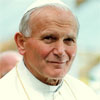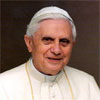This past Memorial Day weekend, "Israel boarded a Gaza-bound 'Freedom Flotilla' and killed an indeterminate number of innocent bystanders as they attempted to take control international waters."
Well, at least that's the take of Henry Karlson of Vox Nova -- who appears to be taking his talking points from Egyptian passenger Hazem Farouq:
"It was hell on the sea. I saw Israeli soldiers killing activists in cold blood and then walking on their bodies ... The Israeli soldiers sprayed bullets as if they were a mafia in an American film."
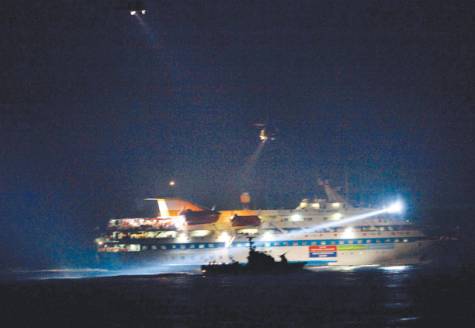
Unfortunately, as with such accounts of Israel's actions, the facts tend to get in the way. Let's examine the various claims of this Catholic blog regarding what happened this weekend ...
Tantamount to Piracy?
[Henry Karlson @ Vox Nova] Israel is claiming the massacre is justified because their soldiers were attacked. They fail to point out they were attacked when they were boarding a vessel they had no lawful authority to board, acting like pirates who think they control the seas.For what it's worth, the Israel Ministry of Foreign Affairs provides a page explaining the legal background behind the Gaza flotilla and the maritime blockade of Gaza:
A maritime blockade is in effect off the coast of Gaza. Such blockade has been imposed, as Israel is currently in a state of armed conflict with the Hamas regime that controls Gaza, which has repeatedly bombed civilian targets in Israel with weapons that have been smuggled into Gaza via the sea. [...]Not only did Israel convey explicit warnings against breaking the blockade, but the interception came after numerous appeals to governments, organizations, and flotilla organizers ahead of their departures, and also during their journeys towards the Gaza shore [to convey the humanitarian supplies by another route]:[I]t should be noted that Israel publicized the existence of the blockade and the precise coordinates of such by means of the accepted international professional maritime channels. Israel also provided appropriate notification to the affected governments and to the organizers of the Gaza protest flotilla. Moreover, in real time, the ships participating in the protest flotilla were warned repeatedly that a maritime blockade is in effect. [...]
Given the protesters explicit intention to violate the naval blockade, Israel exercised its right under international law to enforce the blockade. It should be noted that prior to undertaking enforcement measures, explicit warnings were relayed directly to the captains of the vessels, expressing Israel's intent to exercise its right to enforce the blockade.
In these appeals, it was clarified to the flotilla organizers that they would be able to anchor in the Ashdod port, unload their equipment and transfer it over to the Gaza Strip in an organized manner after it would undergo accepted security checks. When flotilla organizers made it clear that they had no intention of cooperating and accepting the invitation to the Ashdod port, it was decided to intercept the boats and to bring them to the Ashdod port.Consequently, Israel believed it was well within its rights to enforce a declared blockade. See also Israel, the Flotilla and International Waters (discussion with Yaakov @ Newsvine.com).
Update
Ed Morgan, a professor of international law at the University of Toronto, offers a helpful primer on the "Law of the Sea", by which we can judge the flotilla incident:
A naval blockade is defined in Article 7.71 of the U.S. Naval Handbook as “a belligerent operation to prevent vessels and/or aircraft of all nations, enemy as well as neutral, from entering or exiting specified ports, airfields, or coastal areas belonging to, occupied by, or under the control of an enemy nation.” It is designed to stop ships from crossing a cordon separating the enemy’s coast from the high seas. It is therefore often enforced in what would otherwise be international waters approaching, but not necessarily inside, the territorial sea of the blockaded party. [...]A maritime blockade is for security purposes only, and must allow humanitarian assistance to the civilian population. Since the ships sailing for Gaza were on a declared humanitarian mission, those on board had the right to expect that any humanitarian goods would ultimately find their way to their intended recipients. On the other hand, having announced its blockade, Israel had no obligation to take the ships’ crew at their word as to the nature of the cargo. The blockading party has the right to fashion the arrangements, including search at a nearby port, under which passage of humanitarian goods is permitted. San Remo specifies that this inspection should include supervision by a neutral party to prevent the unwarranted seizure of humanitarian supplies and the abuse of humanitarian assistance by the blockaded party.
Finally, the rule of proportionate force, applicable to all armed conflict, applies equally to a naval blockade. Blockading navies are obliged to arrest a ship rather than simply fire on it, and once its soldiers are on board an arrested ship their actions must be proportionate to the threat that they meet. While Israel appears to have met the other criteria eliminating a macro offence, here the facts will have to be gathered from witnesses and videos to determine what level of force was truly needed at the spot where the paintballs met the hammers.
A disproportionate or justified use of armed force?
[Henry Karlson @ Vox Nova] Probably those who attacked the soldiers were acting reflexively without thinking. Let alone the moral question, in all practicality, this was not the wisest thing to do, because the soldiers were heavily armed and could take control of the ship without difficulty.(Elder of Ziyon notes), these would be the same "peace activists" who attacked the IDF commandoes with chains and iron rods, throwing them over railings, stabbing them, and calling for a repeat of Mohammed's massacre of Jews at Khaybar. By contrast, the soldiers by their account were not "heavily armed" but rather were woefully unprepared -- armed with equipped with paintball rifles used to disperse minor protests, and handguns as a last resort in life-threatening situations (as reported by Yediot Ahronot).
Here's how one IDF soldier described the incident:
"We went down with our bare hands and met passengers with glass bottles and clubs," said one fighter squadron participated in the operation.According to Army Radio reporter Gal Lev-Rom, "the soldiers said they were truly not prepared to face violence of this nature":"We were lynched," testified one of the fighters in the hospital. "For every person that came down, three or four people beat him. They were all with metal batons, knives, glass bottles. At one point there was live fire."
"In fact I got there last," said a fighter squadron in an interview with Channel 2 News. "I saw the guys scattered on the deck surrounded each of them with about four people beating him."
"Trying to defend myself I probably broke my hand . All who got on board had no weapons in hand, but their bare hands," explained the soldier. "We came to work things out, but they came for war - the gun was absolutely our last resort."
“The activists had many things ready for an attack on the soldiers,” Lev-Rom said, “including, for instance, a box of 20-30 slingshots with metal balls; these can kill. There were also all sorts of knives and many similar things. These are what they call ‘cold’ weapons, as opposed to live fire. It was quite clear that a lynch had been prepared.”A Reuters cameraman on the Israel Navy ship Kidon, sailing close to the convoy, said IDF commanders monitoring the operation were surprised by the strong resistance (Haaretz):Lev-Rom said, however, that it appears the army, “even though it prepared for many different scenarios, was not ready for this one. The army seems not to have known what type of people were there and what type of weapons they had. It was hard for Israel to conceive that the ship, sponsored by the country of Turkey, would have such weapons. Israel was prepared to deal with anarchists, and instead had to deal with terrorists – that’s the feeling here.”
One of the commandos said some of the soldiers were stripped of their helmets and equipment and a several were tossed from the top deck to a lower deck, forcing them to jump into the sea to escape."They jumped me, hit me with clubs and bottles and stole my rifle," one of the commandos said. "I pulled out my pistol and had no choice but to shoot."
The soldiers said they were forced to open fire after the activists struck one of their comrades in the head and trampled on him. A senior IDF field commander ordered the soldiers then to respond with fire, a decision which the commandos said received full backing the military echelon.
The IDF said its rules of engagement allowed troops to open fire in what it called a "life-threatening situation".
Update!
According to Free Gaza's account of the events, "Under darkness of night, Israeli commandoes dropped from a helicopter onto the Turkish passenger ship, Mavi Marmara, and began to shoot the moment their feet hit the deck. They fired directly into the crowd of civilians asleep."
However, a Turkish paper published pictures of Israeli commandos taken hostage during the initial moments of the flotilla raid, which reveals Free Gaza's claim to be a complete fabrication. The blog Elder of Ziyon comments:
The Turkish newspaper that published the pictures of the IDF soldiers today does not use the meme of ruthless IDF soldiers shooting from the helicopter and murdering civilians within seconds of landing on deck - nor do the pictures support that narrative in the least. Rather, they prove Israel's version of events completely. Yet the Turkish press, as we had seen Friday from some of the Arabic press, instead say how weak and ineffectual the IDF soldiers were, all but mocking them for not using lethal force initially.The newspaper notes, with glee, the fear in the soldiers' faces captured in the photos. It discusses how the brave "humanitarians" fought the mighty IDF with sacks of onions. The article calls the soldiers "amateurish" and "incompetent."
To the supporters of the IHH and its partners, the IDF's reticence in using lethal force is a clear sign of weakness, not a sign of caring about human life.
The 15th and last naval commando from Flotilla 13 (the Shayetet) to rappel down onto the ship from the helicopter, S. said on Thursday that he was immediately attacked by what the IDF has called “the mob of mercenaries” aboard the vessel, just like the soldiers who had boarded just before him.Looking to his side, he saw three of his commanders lying wounded – one with a gunshot wound to the stomach and another with a gunshot wound to the knee. A third was lying unconscious; his skull was fractured by a devastating blow with a metal bar.
As the next in the chain of command, S., who has been in the Shayetet for three and a half years, immediately took charge.
He pushed the wounded soldiers up against the wall of the upper deck and created a perimeter of soldiers around them to begin treating their wounds, he said. He then arranged his men to form a second perimeter, and pulled out his 9 mm. Glock pistol to stave off the charging attackers and to protect his wounded comrades.
The attackers had already seized two pistols from the commandos, and fired repeatedly at them. Facing more than a dozen of the mercenaries, and convinced their lives were in danger, he and his colleagues opened fire, he said. S. singlehandedly killed six men. His colleagues killed another three.
- A soldier that took part in boarding the Mavi Marmara describes the violent confrontation that awaited on it's decks
- Video taken by IDF naval boat shows the passengers of the Mavi Marmara, one of the ships in the 'Free Gaza' Flotilla, violently attacking IDF soldiers with metal poles and chairs.
- IDF soldier being stabbed by Mavi Marmara "peace activist"
- Video of Turkish "peace activists" on Mavi Marmara ambushing and beating soldiers
- In footage captured on the Mavi Marmara, activists are seen attacking the soldiers with a stun grenade, a box of plates, and water hoses as the soldiers attempt to board the ship.
Humanitarians and "Peace activists"
Henry Karlson (Vox Nova) moves on to describe the convoy itself and it's "humanitarian mission":
"The Freedom Flotilla carries more than 10,000 tons of relief and developmental aid to Gaza, along with roughly 700 participants from more than 30 countries, among them volunteers from Canada, South Africa, Algeria, Turkey, Macedonia, Pakistan, Yemin, Kosovo, the UK and US and Kuwait – and an exiled former Archbishop of Jerusalem who currently lives in the Vatican."Here we see the situation involves not just Muslim nations, but many of the nations of the West, such as the United States. We also see that the retired Archbishop of Jerusalem is on board the ship, indicating the active role the Church has had in this humanitarian aid.
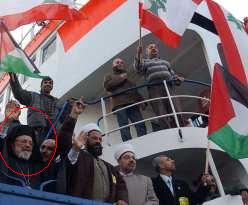 The archbishop in question would be Father Hilarion Capucci
The archbishop in question would be Father Hilarion Capucci... the archbishop of Jerusalem during the 1960s and early 1970s, was arrested by Israeli security forces in 1974 for material support of a terrorist organization. According to Paul Merkley, a historian and author of the book Christian Attitudes Towards the State of Israel,So much for the "Church's involvement" -- what about the rest of the occupants?Capucci used his official limousine and "the cover of his priestly office to personally smuggle explosives, submachine guns, and even katyusha rockets into Israel, which were then used in PLO terrorist actions accounting for the loss of many lives."
The Muslim Brotherhood issued a statement on its English language website this week, announcing the priest's participation in the flotilla and claiming that "the Israeli occupation exiled father Capucci from Palestine because of his honorable national stands."
Sentenced to fifty-seven years in an Israeli prison, the gunrunning clergyman was granted a reprieve in 1977 after direct intervention from the Vatican. The Catholic Church called for Capucci's release on the grounds that his incarceration only served to "aggravate tension."
The Church promised Israeli authorities that Capucci would cease all involvement in political issues regarding the state of Israel. Since that time Capucci has positioned himself as a prominent anti-Zionist activist. In 2009 he was arrested and transferred to Syria by Israeli security forces after attempting to illegally enter Gaza by sea. The former terrorist is also active in promoting the right of return for those Arabs who fled during the 1948 invasion of the newly declared state of Israel.
According to the former archbishop, the founder of his religion was "the first Fedayeen" and he was merely "following his example."
As Jonathan Schanzer (Weekly Standard) points out, the convoy of ships allegedly trying to bring aid to the Gaza Strip was organized by a group belonging to an officially designated terrorist organization:
The Turkish IHH (Islan Haklary Ve Hurriyetleri Vakfi in Turkish) was founded in 1992, and reportedly popped up on the CIA's radar in 1996 for its radical Islamist leanings. Like many other Islamist charities, the IHH has a record of providing relief to areas where disaster has struck in the Muslim world.However, the organization is not a force for good. The Turkish nonprofit belongs to a Saudi-based umbrella organization known to finance terrorism called the Union of Good (Ittilaf al-Kheir in Arabic). Notably, the Union is chaired by Sheikh Yusuf Qaradawi, who is known best for his religious ruling that encourages suicide attacks against Israeli civilians. According to one report, Qardawi personally transferred millions of dollars to the Union in an effort to provide financial support to Hamas.
In 2008, the Israelis banned IHH, along with 35 other Islamist charities worldwide, for its ties to the Union of Good. This was a follow-on designation; Israelis first blocked the Union of Good from operating in the West Bank and Gaza in 2002. [Read the rest]
See also: IHH's support and finance of radical Islamic terror networks - a report by The Intelligence and Terrorism Information Center, according to which it's pretty clear that the activists aboard the Flotilla were hoping to provoke a confrontation with Israel:
On April 7, 2010, IHH head Bülent Yildirim told a press conference in Istanbul that the flotilla would be a “test” for Israel. He said that should Israel oppose the flotilla it would be considered “a declaration of war” on the countries whose activists arrived on board the ships (IHH website, April 7, 2010). In a fiery speech given at the launching of the Mavi Marmaris on May 23, he said to Israel, “Handle this crisis well. If you prevent [the flotilla from reaching the Gaza Strip] you will remain isolated in the world and harm yourselves” (IHH website in Turkish, May 23, 2010). On May 21 Muhammad Kaya, head of IHH’s branch office in the Gaza Strip, said there was a plan to send flotillas to the Gaza Strip every month (Al-Jazeera-Info website, arabianawareness.com, May 21, 2010).Violence and possibly "martyrdom" against Israel was not only anticipated, but sought after according to Dr. Abd Al-Fatah Shayyeq Naaman, lecturer in Shari'ah law at a university in Yemen:
"The [Gaza] flotilla commander said yesterday: 'We will not allow the Zionists to get near us and we will use resistance against them.'Update!How will they wage resistance? They will resist with their fingernails. They are people who seek Martyrdom for Allah, as much as they want to reach Gaza, but the first [Martyrdom] is more desirable."
[Al-Aqsa TV (Hamas), May 30, 2010]
The International Muslim Brotherhood had a heavy hand in orchestrating the flotilla, reports Thomas Jocelyn (Weekly Standard June 3, 2010):
[T]he flotilla was organized in large part by a radical Turkish Islamist organization named IHH (Islan Haklary Ve Hurriyetleri Vakfi). The IHH, in turn, is part of a Saudi-based umbrella group called the Union of Good, which was created by Hamas. [...]Jocelyn goes on to investigate various flotilla passengers' connections to the Muslim Brotherhood. See also MEMRI's extensive investigation and profile of the flotilla passengers: "Writing Wills, Preparing for Martyrdom, Determined to Reach Gaza or Die".The Union of Good’s leaders include Sheikh Yusuf Qaradawi, a top Muslim Brotherhood cleric, and Sheikh Abd al Majid al Zindani, who heads Yemen’s Islah party. Zindani and the Islah party have deep Brotherhood roots.
In other words, the IHH is an offshoot of the Union of Good, which is in turn an offshoot of the Brotherhood -- as is Hamas.
Not without reason does Israeli ambassador Michael B. Oren describe the flotilla as "An Assault, Cloaked in Peace" (New York Times June 3, 2010):
What the videos don’t show, however, are several curious aspects Israeli authorities are now investigating. First, about 100 of those detained from the boats were carrying immense sums in their pockets — nearly a million euros in total. Second, Israel discovered spent bullet cartridges on the Mavi Marmara that are of a caliber not used by the Israeli commandos, some of whom suffered gunshot wounds. Also found on the boat were propaganda clips showing passengers “injured” by Israeli forces; these videos, however, were filmed during daylight, hours before the nighttime operation occurred.And The Washington Post now charges the Turkish government of Recep Tayyip Erdogan with responsibility for the flotilla fiasco:The investigations of all this evidence will be transparent, in accordance with Israel’s security needs.
Turkey's ambassador to the United States makes the argument that Israel had no cause to clash with the "European lawmakers, journalists, business leaders and an 86-year-old Holocaust survivor" who were aboard the flotilla. But there was no fighting with those people, or with five of the six boats in the fleet. All of the violence occurred aboard the Turkish ferry Mavi Marmara, and all of those who were killed were members or volunteers for the Islamic "charity" that owned the ship, the Humanitarian Relief Foundation (IHH).The relationship between Mr. Erdogan's government and the IHH ought to be one focus of any international investigation into the incident. The foundation is a member of the "Union of Good," a coalition that was formed to provide material support to Hamas and that was named as a terrorist entity by the United States in 2008.
Against the Distribution of Humanitarian Aid?
What of the humanitarian supplies that Israel was dead-set against giving to the Gazans? (Jerusalem Post June 4, 2010):
Twenty-four hours after the last ship of the Gaza aid flotilla entered the Ashdod Port under the watchful eye of the Israeli Navy, all of the equipment on board was examined Tuesday and the majority of it was loaded onto trucks headed to the Kerem Shalom border crossing. The flotilla’s flagship, the Marmara - where the clash between Israeli commandoes and the passengers took place and which held the participant’s personal belongings - had yet to be fully inspected.In fact, on the topic of humanitarian aid to Gaza, see this report: Behind the Headlines: The Israeli humanitarian lifeline to Gaza (Israel Ministry of Foreign Affairs):In a statement to reporters at the port on Tuesday, Colonel Moshe Levi, commander of the IDF’s Gaza Strip Coordination and Liaison Administration (CLA), said that none ofthe equipment found on board the three cargo ships was in shortage in Gaza.
Large quantities of essential food items like baby formula, wheat, meat, dairy products and other perishables are transferred daily and weekly to Gaza. Fertilizers that cannot be used to make explosives are shipped into the Strip regularly, as are potato seeds, eggs for reproduction, bees, and equipment for the flower industry.Update!In 2009 alone, more than 738,000 tons of food and supplies entered Gaza. Pictures in local newspapers show local markets aplenty with fruit, vegetables, cheese, spices, bread and meat to feed 1.4 million Gazans.
In the first quarter of 2010 (January-March), 94,500 tons of supplies were transferred in 3,676 trucks to the Strip: 48,000 tons of food products; 40,000 tons of wheat; 2,760 tons of rice; 1,987 tons of clothes and footwear; 553 tons of milk powder and baby food.
In a typical week the IDF coordinates the transfer of hundreds of trucks containing about 15,000 tons of supplies. During the week of May 18, 2010 there were more than 100 truckloads of animal food, 65 trucks of fruit and vegetables; 22 truckloads of sugar, some 27 truckloads of meat, poultry and fish; and 40 trucks of dairy products. At holiday times, Israel increases transfers. During the Muslim holy days of Ramadhan and Eid al-Adha, Israel shipped some 11,000 heads of cattle into the Strip.
Israel's attempts to deliver the humanitarian aid were thwarted by Hamas, who refused to accept the cargo (CNN June 2, 2010):
Palestinian sources confirmed that trucks that arrived from Israel at the Rafah terminal at the Israel-Gaza border were barred from delivering the aid.Ra'ed Fatooh, in charge of the crossings, and Jamal Khudari, head of a committee against the Gaza blockade, said Israel must release all flotilla detainees and that it will be accepted in the territory only by the Free Gaza Movement people who organized the flotilla.
Israel said it had 20 trucks of aid found on the ships, such as expired medications, clothing, blankets, some medical equipment and toys.
Israel has released all foreign flotilla detainees by Wednesday, but four Israeli Arabs remain in custody.
Hamas' refusal of aid to the Gazans is to be expected. As Der Spiegel reports, "International donations are not always welcome in Gaza" (June 4, 2010):
"People who are not in with Hamas don't see any of the relief goods or the gifts of money," Khadar says. On the sand dune where his house once perched, there is now an emergency shelter. The shelter is made of concrete blocks that Khadar dug from the rubble, and the roof is the canvas of a tent that provided the family with shelter for the first summer after the war. "Hamas supporters get prefabricated housing, furnishings and paid work. We get nothing," Khadar complains.The reason his family receives nothing: Like many of his neighbors, Khadar is a die-hard supporter of the Fatah party, the sworn political enemy of the more radical Islamists in Hamas. [...]
"We knew Hamas would take the goods for themselves and distribute them at their own discretion. For us, and for many of our friends, it doesn't make any difference whether the world is trying to help us. Our situation will only improve if the blockade is lifted," Khadar explains.
On Saturday (May 5, 2010), IDF forces piloted the Rachel Corrie to the port of Ashdod after boarding the ship. The Jerusalem Post reports:
None were harmed in the military operation as the international activists on the ship cooperated with the boarding party. The activists went as far as lowering a ladder to the soldiers patrol boat to allow them to board, army sources have revealed.The military said its forces boarded the 1,200-ton cargo ship from the sea, not helicopters. Army spokeswoman Lt. Col. Avital Leibovich said Saturday's takeover took only a few minutes and that the vessel was being taken to Ashdod port.
Prior to the takeover, three navy ships tailed the aid boat for several hours throughout the morning, a few dozen kilometers from the blockaded Strip. The army said it had contacted the boat four times and urged its passengers to divert to Ashdod, but the activists had repeatedly refused.
Curiously, despite Gaza's need for assistance, The Free Gaza organization refused Israel's offers to facilitate the further distribution of aid from additional ships - Elder of Ziyon posts the radio exchanges btw/ ships and reports:
The flotilla team repeatedly had said that the reason the refuse to go to Ashdod is because Israel would not allow some of their cargo to go to Gaza. Here. we hear that Israel not only offered to transfer the cement that would have been brought on the ship to Gaza, but also that it would allow a third party NGO to bring it into Gaza.Although their final response is not on this audio recording, Free Gaza evidently refused, although they were quite polite about it. They even helped the IDF soldiers get onto the ship.
I believe Israel has the right to protect its citizens from harm by way of a blockade of arms to Gaza (the controlling authority of which is Hamas, after all, an organization complicit in many terrorist acts against Israel's citizens and wholly committed to the eradication of Israel).
However, this is not to say that Israel didn't act badly in this situation and make some grievous errors in judgement resulting in the needless deaths of Palestinians as well as its own troops. Let's admit it -- those who organized the Flotilla got what they wanted: to force the hand of Israel and achieve a major propaganda win for her enemies.
Yaacov Lozowick (author of Right to Exist: A Moral Defense of Israel's Wars
Israel will not disappear, not now, not later. It is one of the most vital places on earth, bursting with creativity and hugely committed to success; this is also one of the better moments in 3000 years of Jewish history – a rather glum statement, that, but true. Yet Israel is not being wise, as the case of the flotilla shows.We all know that the threat from Hezbollah is greater than from Hamas, yet we don't blockade Lebanon. The price would be too high, so we grimly prepare for the next war in the hope that being prepared well enough will postpone it for a while, and in the meantime it's not an international detriment; on the contrary, perhaps we gain a measure of goodwill that we'll cash in on eventually. So why blockade Gaza? Is the blockade essential? Six months from now, or six years, we'll lift it, and Gaza will still be full of people who fervently wish for our destruction, just like in Lebanon: nu? At that point the defunct blockade will no longer be essential?
Some military actions will always be unavoidable. Do we do our very best to ensure that when we apply force, we're doing so in the most brilliant way possible? Have we thought out every scenario, and formulated a response to every counter move our enemies will make? Couldn't we could have silently jammed the propellers of those ships, leaving them dead in the water and begging us to save them from the blistering heat? Instead of heroic victims they'd be the world's laughing stock. I'm a mere blogger, not a decision maker, so perhaps there were reasons not to go that way: but were all options considered? Was the fiasco we ended up with the sole alternative? We handed our enemies an epic propaganda victory on a silver platter: that can't have been the best option?
See also:
- Israel was Right Israeli commandos mishandled the situation but Israel was right to storm a ship bound for Gaza. Leslie H. Gelb argues why.
- LiveBlogging the "Free Gaza" Media War (BackSpin)
- Flotillas and Falsehoods Monica Charen (National Review wonders, "don’t members of the press ever resent being so used?"
- Turkey Slouches Toward Iran, by Seth Cropsey (Weekly Standard): "The flotilla incident is less about Israeli-Palestinian issues than it is about Turkey."
- Those troublesome Jews, by Charles Krauthammer. Washington Post June 4, 2010.

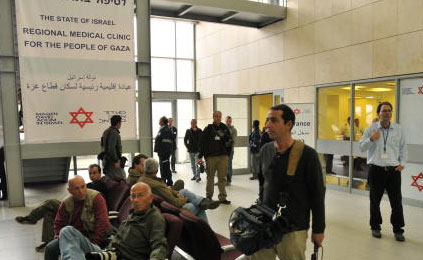
 With all due respect, I have reasons to approach this statistic with some skepticism. Most curiously, Hudson himself has previously cited (approvingly!) the work of Justus Reid Weiner, an international human rights lawyer who has made the plight of Palestinian Christians a subject of personal research. You can read an interview with Weiner
With all due respect, I have reasons to approach this statistic with some skepticism. Most curiously, Hudson himself has previously cited (approvingly!) the work of Justus Reid Weiner, an international human rights lawyer who has made the plight of Palestinian Christians a subject of personal research. You can read an interview with Weiner 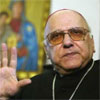 The numerous incidents of Muslim persecution told by Weiner
The numerous incidents of Muslim persecution told by Weiner 
 The Church speaks on a completely different plane. She has a completely different mission. The Church never supports one Nation against another, and never acts as arbitrator, except when invited to do so by all the parties concerned. The Church promotes solely the exigencies of humanity and gives voice to mercy, to divine and human pity, to that righteousness that love alone fulfils. If there are circumstances in which political communities, acting within the specific logic of this-worldly power-relationships, judge that they cannot avoid the recourse to force, the Church cannot be there to bless their arms. This was recognised by Benedict XV well before being confirmed by Benedict XVI.
The Church speaks on a completely different plane. She has a completely different mission. The Church never supports one Nation against another, and never acts as arbitrator, except when invited to do so by all the parties concerned. The Church promotes solely the exigencies of humanity and gives voice to mercy, to divine and human pity, to that righteousness that love alone fulfils. If there are circumstances in which political communities, acting within the specific logic of this-worldly power-relationships, judge that they cannot avoid the recourse to force, the Church cannot be there to bless their arms. This was recognised by Benedict XV well before being confirmed by Benedict XVI.
 Personally, I can respect the Vatican's position as described by Fr. Jaeger. I would also add that this position as explicated in this essay seems to be fully embodied in the words and actions of Pope Benedict XVI.
Personally, I can respect the Vatican's position as described by Fr. Jaeger. I would also add that this position as explicated in this essay seems to be fully embodied in the words and actions of Pope Benedict XVI. 

